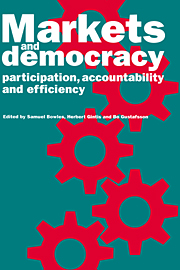Book contents
- Frontmatter
- Contents
- List of figures
- List of tables
- Preface
- 1 Post-Walrasian political economy
- Part I Agency, incentives, and democratic accountability
- Part II Institutions and institutional change
- 4 Toward a framework for analyzing institutions and institutional change
- 5 Imperfect choice and rule-governed behavior
- 6 Organizational equilibria and institutional stability
- 7 Agency problems and the future of comparative systems' theory
- Part III Conditions for the success of the democratic firm
- Part IV Productivity, distribution, and power
- Part V Ownership, participation and capital markets
- Part VI Political democracy and economic democracy
- Bibliography
- Author index
- Subject index
5 - Imperfect choice and rule-governed behavior
Published online by Cambridge University Press: 05 March 2012
- Frontmatter
- Contents
- List of figures
- List of tables
- Preface
- 1 Post-Walrasian political economy
- Part I Agency, incentives, and democratic accountability
- Part II Institutions and institutional change
- 4 Toward a framework for analyzing institutions and institutional change
- 5 Imperfect choice and rule-governed behavior
- 6 Organizational equilibria and institutional stability
- 7 Agency problems and the future of comparative systems' theory
- Part III Conditions for the success of the democratic firm
- Part IV Productivity, distribution, and power
- Part V Ownership, participation and capital markets
- Part VI Political democracy and economic democracy
- Bibliography
- Author index
- Subject index
Summary
Introduction
Economics has traditionally assumed that agents always make best decisions based on available information. The latter may itself be inaccurate or incomplete, but no further imperfection enters into the analysis about agents' ability to decide optimally. Not surprisingly, perfect decisions have been criticized by many investigators including Simon (1983), Elster (1984), Tversky and Kahneman (1974), Slovic and Lichtenstein (1983), as well as by decision theorists such as Arrow (1982, 1986), Nelson and Winter (1982). Despite the plausibility of these criticisms, it has still proven difficult to develop useful analytical tools that do not depend on assuming perfect choice. I shall thus describe a conceptual framework and related theoretical tools for studying the behavioral implications of imperfect choice that may not always react optimally to information. The resulting analysis implies that imperfect agents will benefit from following rules adapted only to recurrent situations rather than allowing complete freedom to decide independently on a case-by-case basis, thereby producing a tendency to ignore relevant and even costlessly available information.
From imperfect choice to predictable behavior
I begin by suggesting a conceptual basis for analyzing imperfect choice. Figure 5.1 depicts a flow chart beginning with imperfect decisions and ending with systematic behavior patterns. Two guiding intuitions on how to model behavior are shown. Standard analysis combines the first two steps leading to conclusion A: that modeling systematic features of behavior requires exclusive focus on perfect choice. Despite many helpful ways of modifying standard theory, like adding search and transaction costs (Williamson, 1979; McCall, 1965; Stigler, 1961), decision errors still ultimately represent unpredictable tendencies which cannot in and of themselves contribute to systematic regularities in behavior.
- Type
- Chapter
- Information
- Markets and DemocracyParticipation, Accountability and Efficiency, pp. 68 - 85Publisher: Cambridge University PressPrint publication year: 1993
- 2
- Cited by

